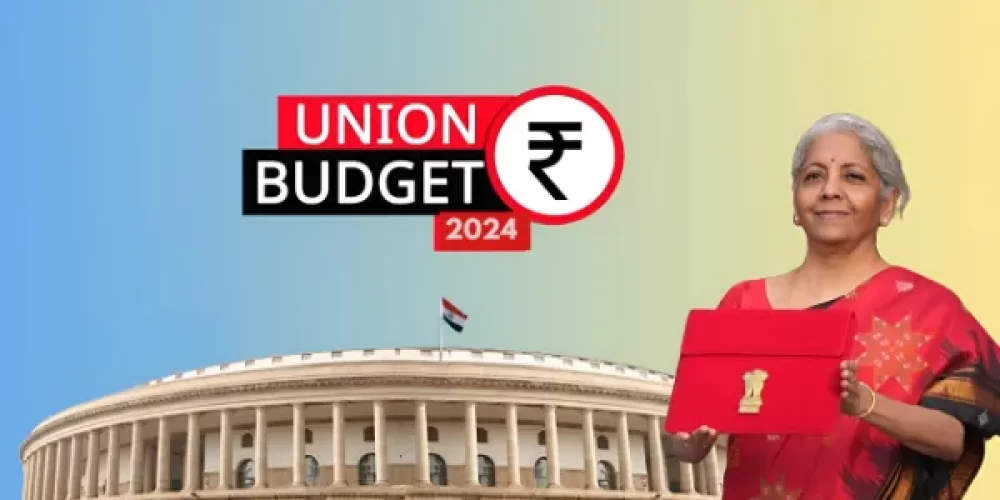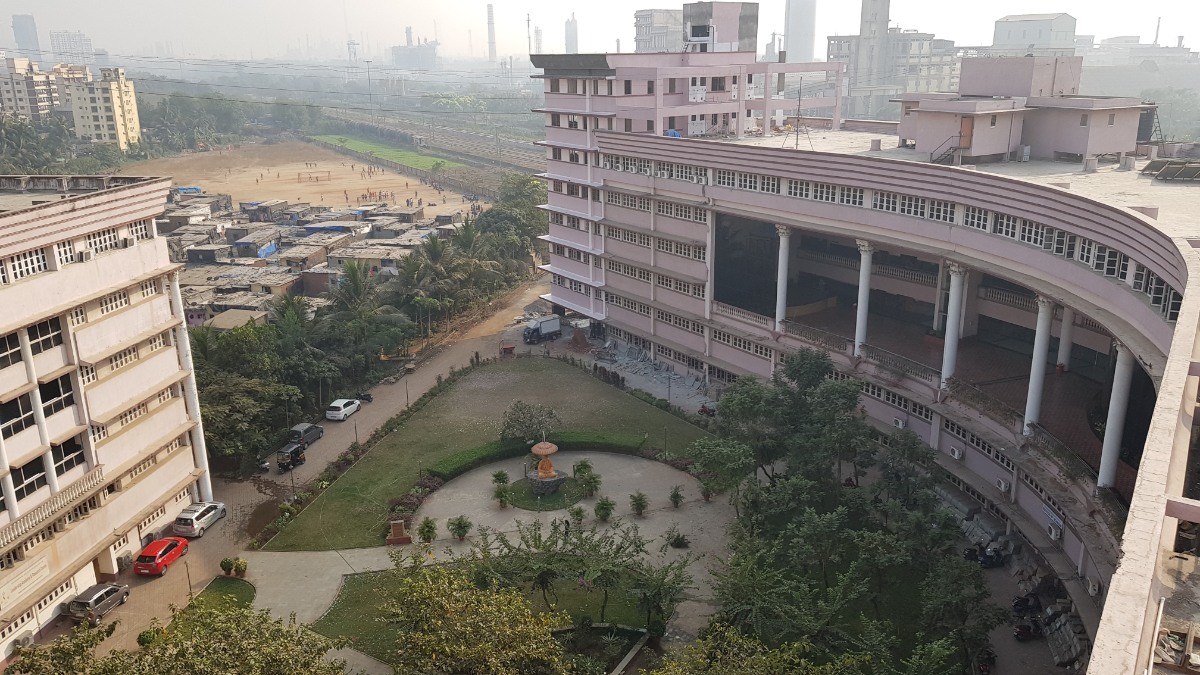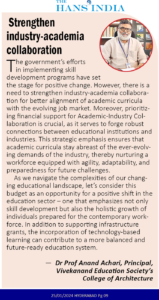The government’s efforts in implementing skill development programs have set the stage for positive change. However, there is a need to strengthen industry-academia collaboration for better alignment of academic curricula with the evolving job market. Moreover, prioritizing financial support for Academic-Industry Collaboration is crucial, as it serves to forge robust connections between educational institutions and industries.
– Dr. Prof Anand Achari, Principal, Vivekanand Education Society’s College of Architecture
Budget 2024 Expectations for Education & Skills sector: Prioritizing education and skills ecosystem needed to realize Aatmanirbhar vision
“As we navigate the complexities of our changing educational landscape, let’s consider this budget as an opportunity for a positive shift in the education sector – one that emphasizes not only skill development but also the holistic growth of individuals prepared for the contemporary workforce,” says Dr. Prof Anand Achari, Principal, Vivekanand Education Society’s College of Architecture as the opening expectation statement from the budget.
Pre Budget Quote – VES College of Architecture
Dr. Prof Anand Achari, Principal, Vivekanand Education Society’s College of Architecture
The Government of India has embarked on several initiatives and reforms to implement the National Education Policy (NEP) 2020. As these efforts persist, additional support is anticipated in the upcoming budget. Incorporating the Indian Knowledge System (IKS) into the curriculum necessitates the development or upgrading of curricula, training or orientation for faculty, and the empanelment of artists and artisans-in-residence in Higher Education Institutions.
The government’s efforts in implementing skill development programs have set the stage for positive change. However, there is a need to strengthen industry-academia collaboration for better alignment of academic curricula with the evolving job market. Moreover, prioritizing financial support for Academic-Industry Collaboration is crucial, as it serves to forge robust connections between educational institutions and industries. This strategic emphasis ensures that academic curricula stay abreast of the ever-evolving demands of the industry, thereby nurturing a workforce equipped with agility, adaptability, and preparedness for future challenges.
Additionally, it’s important to extend support to COA-approved Institutes with larger research grants akin to those provided to AICTE. This will foster innovation and excellence in education.
As we navigate the complexities of our changing educational landscape, let’s consider this budget as an opportunity for a positive shift in the education sector – one that emphasizes not only skill development but also the holistic growth of individuals prepared for the contemporary workforce.
In addition to supporting infrastructure grants, the incorporation of technology-based learning can contribute to a more balanced and future-ready education system.
Pre-Budget Expectation 2024-25: Here’s what education sector expect
Dr Prof Anand Achari, Principal, Vivekanand Education Society’s College of Architecture
The government’s efforts in implementing skill development programs have set the stage for positive change. However, there is a need to strengthen industry-academia collaboration for better alignment of academic curricula with the evolving job market. Moreover, prioritizing financial support for Academic-Industry Collaboration is crucial, as it serves to forge robust connections between educational institutions and industries. This strategic emphasis ensures that academic curricula stay abreast of the ever-evolving demands of the industry, thereby nurturing a workforce equipped with agility, adaptability, and preparedness for future challenges. As we navigate the complexities of our changing educational landscape, let’s consider this budget as an opportunity for a positive shift in the education sector – one that emphasizes not only skill development but also the holistic growth of individuals prepared for the contemporary workforce. In addition to supporting infrastructure grants, the incorporation of technology-based learning can contribute to a more balanced and future-ready education system.
Budget 2024: Educational sector seeks investments for NEP goals and human resources
Budget 2024: Academia calls for a boost in higher education funding
Dr. (Prof.) Anand Achari, Principal, Vivekanand Education Society’s College of Architecture, highlights the need for additional support in curriculum development, skill programs, and industry-academia collaboration. He sees the Budget as an opportunity for positive shifts, emphasizing a holistic approach to education.
Budget Expectations 2024: Focus on research, skill development and job creation
Interim Budget 2024: What does the education sector expect from Centre?
Budget 2024: Here’s what stakeholders expect for higher education in India
Vocational Training
In the context of the higher education arena in the country, NEP mainly aims to achieve the establishment of at least one large multi-disciplinary higher education institution in every district, improving accessibility, increase in research & innovation and expanding the vocational training of the students.
With NEP setting targets of achieving 50% GER in higher education, employment and job opportunities for the graduates will have to be addressed. This is where vocational training for students comes into play.
“ The government’s efforts in implementing skill development programs have set the stage for positive change. However, there is a need to strengthen industry-academia collaboration for better alignment of academic curricula with the evolving job market. Moreover, prioritising financial support for Academic-Industry Collaboration is crucial, as it serves to forge robust connections between educational institutions and industries. This strategic emphasis ensures that academic curricula stay abreast of the ever-evolving demands of the industry, thereby nurturing a workforce equipped with agility, adaptability, and preparedness for future challenges. Additionally, it’s important to extend support to COA-approved Institutes with larger research grants akin to those provided to AICTE. This will foster innovation and excellence in education,” says Dr Prof Anand Achari, Principal, Vivekanand Education Society’s College of Architecture.
EXPERTS’ POINTS OF VIEW ON PRE-UNION BUDGET
Experts from the Education sector quote views on the Pre-Union Budget for the fiscal year 2024-25 throwing light on the various changes and developments which can be made in the Pre-Budget for the holistic growth of individuals
1. Pre-Budget quote – “Incorporating Indian Knowledge System, key for upgrading curricula”
- Dr Prof Anand Achari, Principal of Vivekanand Education Society’s College of Architecture speaks on the Pre-budget 2024 in the Education sector
“The Government of India has embarked on several initiatives and reforms to implement the National Education Policy (NEP) 2020. As these efforts persist, additional support is anticipated in the upcoming budget. Incorporating the Indian Knowledge System (IKS) into the curriculum necessitates the development or upgrading of curricula, training or orientation for faculty and the empanelment of artists and artisans-in-residence in Higher Education institutions.
The government’s efforts in implementing skill development programmes have set the stage for positive change. However, there is a need to strengthen industry-academia collaboration for better alignment of academic curricula with the evolving job market. Moreover, prioritizing financial support for Academic-Industry Collaboration is crucial, as it serves to forge robust connections between educational institutions and industries. This strategic emphasis ensures that academic curricula stay abreast of the ever-evolving demands of the industry, thereby nurturing a workforce equipped with agility, adaptability and preparedness for future challenges. Additionally, it’s important to extend support to COA-approved Institutes with larger research grants akin to those provided to All India Council for Technical Education (AICTE). This will foster innovation and excellence in education.
As we navigate the complexities of our changing educational landscape, let’s consider this budget as an opportunity for a positive shift in the education sector – one that emphasizes not only skill development but also the holistic growth of individuals prepared for the contemporary workforce. In addition to supporting infrastructure grants, the incorporation of technology-based learning can contribute to a more balanced and future-ready education system.”
Budget 2024 expectations: From human resource investments to fulfilling NEP goals, here’s what education sector needs
Vivekanand Education Society’s College of Architecture Principal Anand Achari mentioned that incorporating the Indian knowledge system into the curriculum requires the development or upgradation of curricula, training or orientation for faculty, and the empanelment of artists- and artisans-in-residence in higher education institutions.




